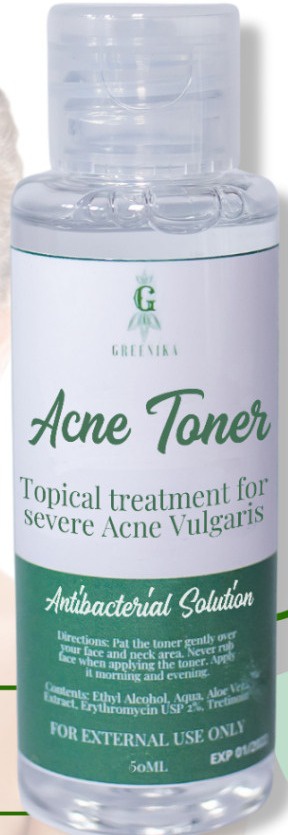
Acne Toner
Highlights
Skim through
| Ingredient name | what-it-does | irr., com. | ID-Rating |
|---|---|---|---|
| Ethyl Alcohol | antimicrobial/antibacterial, solvent, viscosity controlling | icky | |
| Aqua | solvent | ||
| Aloe Vera Extract | soothing, emollient, moisturizer/humectant | goodie | |
| Tretinoin | cell-communicating ingredient | superstar |
Greenika Acne TonerIngredients explained
Simply alcohol refers to ethanol and it's a pretty controversial ingredient. It has many instant benefits: it's a great solvent, penetration enhancer, creates cosmetically elegant, light formulas, great astringent and antimicrobial. No wonder it's popular in toners and oily skin formulas.
The downside is that it can be very drying if it's in the first few ingredients on an ingredient list.
Some experts even think that regular exposure to alcohol damages skin barrier and causes inflammation though it's a debated opinion. If you wanna know more, we wrote a more detailed explanation about what's the deal with alcohol in skincare products at alcohol denat. (it's also alcohol, but with some additives to make sure no one drinks it).
Good old water, aka H2O. The most common skincare ingredient of all. You can usually find it right in the very first spot of the ingredient list, meaning it’s the biggest thing out of all the stuff that makes up the product.
It’s mainly a solvent for ingredients that do not like to dissolve in oils but rather in water.
Once inside the skin, it hydrates, but not from the outside - putting pure water on the skin (hello long baths!) is drying.
One more thing: the water used in cosmetics is purified and deionized (it means that almost all of the mineral ions inside it is removed). Like this, the products can stay more stable over time.
The extract coming from the juice containing leaves of the Aloe vera plant. It's usually a hydroglycolic extract (though oil extract for the lipid parts also exists) that has similar moisturizing, emollient and anti-inflammatory properties as the juice itself. We have written some more about aloe here.
- Tretinoin (a metabolite of vitamin A) is the gold standard anti-aging ingredient that is also FDA-approved (and it's the only one so far!)
- It's an all around skin issue fixer as it works at the skin cell level and makes your skin cells behave in a healthy and normal way
- It makes the skin less wrinkled, firmer, smoother and tighter, everything you could want from an anti-aging ingredient
- It's also an effective acne treatment. It normalizes keratinization and makes the pores produce less sebum
- It's also a skin lightener though not as effective as gold-standard hydroquinone.
- Side effects with tretinoin are very common. Irritation, skin flaking, redness, and drier skin are usual
- Do not use tretinoin (or any form of retinoids) while pregnant
- To minimize side effects introduce tretinoin slowly into your routine (see more how to use tips in geeky details)
You may also want to take a look at...
| what‑it‑does | antimicrobial/antibacterial | solvent | viscosity controlling |
| what‑it‑does | solvent |
| what‑it‑does | soothing | emollient | moisturizer/humectant |
| what‑it‑does | cell-communicating ingredient |





